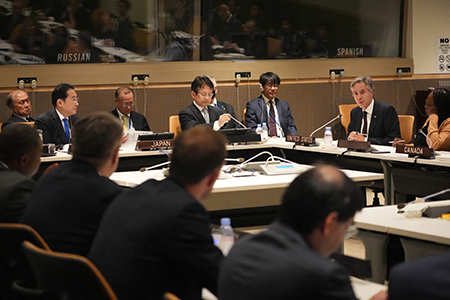“For half a century, ACA has been providing the world … with advocacy, analysis, and awareness on some of the most critical topics of international peace and security, including on how to achieve our common, shared goal of a world free of nuclear weapons.”
New Group Seeks Progress on Fissile Material Treaty
November 2024
By Shizuka Kuramitsu
Twelve countries launched a cross-regional group called Friends of a Fissile Material Cut-off Treaty on Sept. 23 with the aim of expanding support for negotiating a treaty banning the production of fissile materials for nuclear weapons.

The group, also known as FMCT Friends, consists of Australia, Brazil, Canada, France, Germany, Italy, Japan, the Netherlands, Nigeria, the Philippines, the United Kingdom, and the United States. It kicked off the initiative with a high-level meeting on the sidelines of the UN General Assembly in New York.
In a joint statement, members committed to “work closely together to realize the common objectives of the group, which are to maintain and enhance political attention to [a fissile material cutoff treaty] FMCT as a priority action to forestall a recurrence of a nuclear arms race, and to contribute to expanding the support for the immediate commencement of negotiations…amid the heightened risk of destabilization.”
Further, the group underscored its expectation that the Conference on Disarmament (CD) in Geneva should consider negotiations on the proposed treaty “as a matter of priority in its work,” the statement said.
During the launch event, former Japanese Prime Minister Fumio Kishida expressed concern that “we are on the brink of a possible reversal of the downward trend in the number of nuclear weapons since the Cold War” and emphasized the importance of an FMCT as a framework to maintain the downward trend “by limiting the quantitative increase in nuclear weapons.”
Kishida said that “[n]ow is the time for strong political will to begin negotiations that materialize” the expert-level discussions that have been underway since U.S. President Bill Clinton proposed the FMCT concept 30 years ago.
U.S. Secretary of State Antony Blinken said that the proposed treaty “is the next step on the path to nuclear disarmament.” Although such a treaty “cannot address every nuclear risk…it would limit the unconstrained expansion of nuclear arsenals as well as reduce the nuclear risks they’re bringing,” he said.
The Japanese Foreign Ministry said that the FMCT Friends initiative would involve the participation of nuclear- and non-nuclear-weapon states. “There was a unanimous support among the participating countries on the commencement of FMCT negotiations and [the] importance of transparency measures and a fissile materials production moratorium” until a treaty enters formally into force, said a Japanese Foreign Ministry official to Arms Control Today.
“We hope to boost political momentum in those areas at the [CD] and are willing to gain a wider support to our initiative,” the official said.
By raising an issue that existing stockpiles of fissile materials should be constrained under a treaty, Pakistan has blocked the start of FMCT negotiations in the CD, a 65-member body that operates by consensus, since May 2009. (See ACT, April 2010.)
Plans to establish the FMCT Friends group was announced by Japanese Foreign Minister Yoko Kamikawa when Tokyo chaired a high-level UN Security Council meeting on nuclear disarmament and nonproliferation in March. (See ACT, April 2024.)
